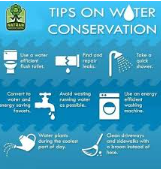Next to air, water is the most important element for the preservation of life. Water is a finite commodity which, if not managed properly, will result in shortages in the near future. Water conservation can go a long way to help alleviate these impending shortages.
- Check your toilet for leaks.
Put a few drops of food coloring in your toilet tank. If, without flushing, the coloring begins to appear in the bowl, you have a leak that may be wasting multiple gallons of water a day.
- Stop using your toilet as an ashtray or wastebasket
Every cigarette butt or tissue you flush away also flushes away at least 1.6 gallons of water.
- Put a plastic bottle in your toilet tank
Put an inch or two of sand or pebbles in the bottom of a one liter bottle to weigh it down. Fill the rest of the bottle with water and put it in your toilet tank, safely away from the operating mechanism. In an average home, the bottle may save five gallons or more of water every day without harming the efficiency of the toilet. If your tank is big enough, you may even be able to put in two bottles.
- Take shorter showers
A typical shower uses two to five gallons of water a minute. Limit your showers to the time it takes to soap up, wash down and rise off.
- Install water-saving shower heads or flow restrictors
Your hardware or plumbing supply store stocks inexpensive shower heads or flow restrictors that will cut your shower flow to about three gallons a minute instead of five to ten. They are easy to install, and your showers will still be cleansing and refreshing.
- Take baths
A partially filled tub uses less water than all but the shortest showers.
- Turn off the water while brushing your teeth
Before brushing, wet your brush and fill a glass for rinsing your mouth.
- Turn off the water while shaving
Fill the bottom of the sink with a few inches of warm water in which to rinse your razor.
- Check faucets and pipes for leaks
Even a small drip can waste multiple gallons of water a day.
- Use your automatic dishwasher for full loads only
Running your dishwasher less often saves water and money.
- Use your automatic washing machines only for full loads only
Doing half loads, or small laundry loads add up to gallons of wasted water. Modify washer machine setting if you must do a small load.
- Turn off the water while brushing your teeth
Before brushing, wet your brush and fill a glass for rinsing your mouth.
- Turn off the water while shaving
Fill the bottom of the sink with a few inches of warm water in which to rinse your razor.
- Check faucets and pipes for leaks
Even a small drip can waste multiple gallons of water a day.
- Use your automatic dishwasher for full loads only
Running your dishwasher less often saves water and money.
- Use your automatic washing machines only for full loads only
Doing half loads, or small laundry loads add up to gallons of wasted water. Modify washer machine setting if you must do a small load.
- Turn off the water while brushing your teeth
Before brushing, wet your brush and fill a glass for rinsing your mouth.
- Turn off the water while shaving
Fill the bottom of the sink with a few inches of warm water in which to rinse your razor.
- Check faucets and pipes for leaks
Even a small drip can waste multiple gallons of water a day.
- Use your automatic dishwasher for full loads only
Running your dishwasher less often saves water and money.
- Use your automatic washing machines only for full loads only
Doing half loads, or small laundry loads add up to gallons of wasted water. Modify washer machine setting if you must do a small load.
- Don't let the faucet run while you clean vegetables
Rinse your vegetables instead in a bowl or sink full of clean water.
- Keep a bottle or pitcher of drinking water in the refrigerator
This puts a stop to the wasteful practice of running tap water to cool it for drinking.
- If you wash dishes by hand, don't leave the water running for rinsing
If you have two sinks, fill one with rinse water. If you have only one sink, first gather all your washed dishes in a dish rack, then rinse them quickly with a spray device or a pan of water.
- Check faucets and pipes for leaks
Leaks waste water 24 hours a day, seven days a week. An inexpensive washer is usually enough to stop them.

